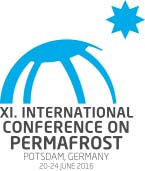- > Conference Videos
- > Conference Photos
- > Award Winners
- > REKLIM-DEKRA Social Media Project
- > ICOP 2016 Frostbytes
- > Book of Abstracts
-
Early Bird Registration
Closes 11 March 2016 -
Hotel room reservation
11 March 2016 -
Release of Provisional Program
15 April 2016 -
Final Payment deadline
31 May 2016
Award Winners
Awards
During the 11th International Conference on Permafrost in Potsdam/Germany, 20-24 June 2016, several awards were given out by the IPA, PYRN and the journal Permafrost and Periglacial Processes.
The International Permafrost Association (IPA) is the host of three awards, eached geared towards excellence in permafrost research and involvement in the permafrost community. These three awards are:
The IPA Lifetime Achievement Award, granted every two years to acknowledge the lifetime contribution of individuals for outstanding permafrost science and engineering research and/or for exceptional contributions to the international permafrost research community. The Troy L. Pewe Award, awarded at each International Conference on Permafrost, for an excellent presentation by a young scientist in permafrost science.The Pavel I. Melnikov Award, awarded at each International Conference on Permafrost, for an excellent presentation by a young scientist in permafrost engineering.
Since 2006, the Permafrost Young Researchers Network (PYRN) has organized annual “Outstanding Presentation Awards” at international permafrost conferences. The following awards will be given during ICOP2016:
- The PYRN-IPA Award for Outstanding Poster Presentation (Science and Engineering)
- The PYRN-IPA Award for the best FrostByte (short online videos about new projects and discoveries) (Science and Engineering)
The Wiley-Blackwell Award for Excellence in Permafrost Research will be acknowledged through a plenary lecture during the conference. The recipient of the Wiley-Blackwell Award is selected by the editorial board of the journal Permafrost and Periglacial Processes.
Winners
Hugh M. French received the IPA Lifetime Achievement Award 2016 for outstanding contributions to permafrost science and the international permafrost research community. The IPA presented the recipient of the IPA Lifetime Achievement Award during the opening ceremony.
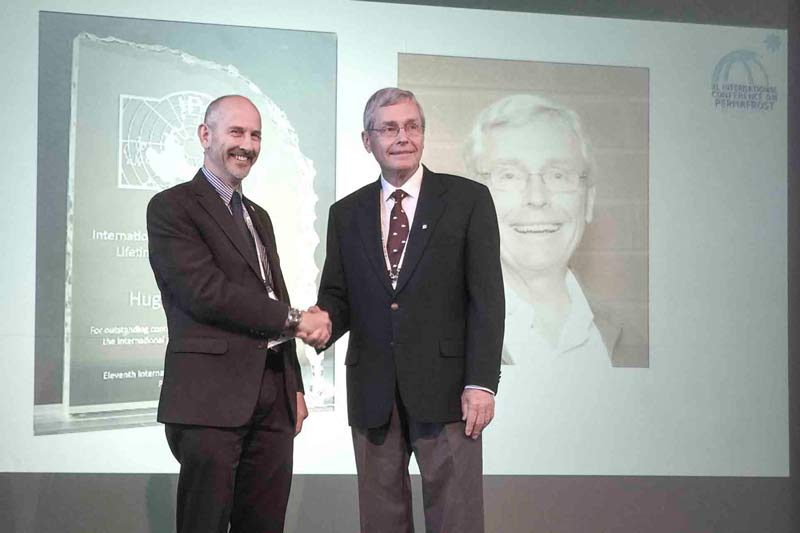
Melissa K. Ward (McGill University) received the Troy L. Péwé Award for her oral science presentation entitled “Using a mix-methods approach to monitor thermokarst activity in the Eureka Sound Lowlands, Ellesmere Island, Nunavut”.
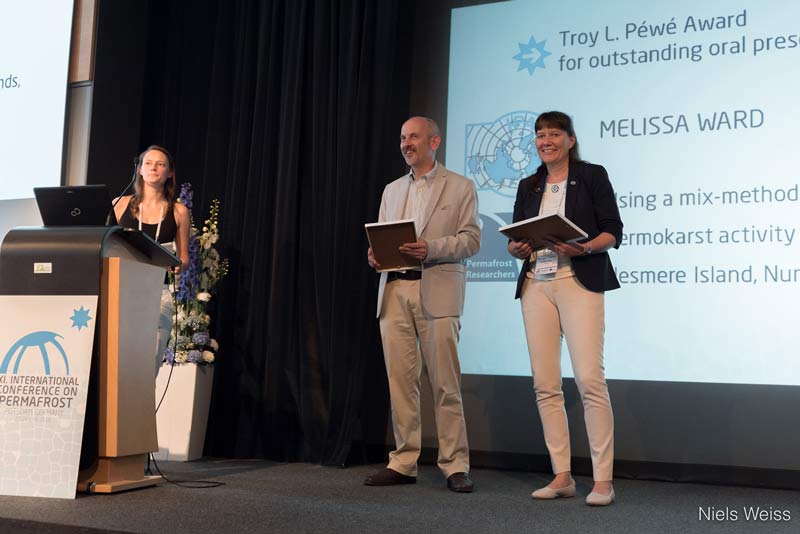
Heather M. Brooks (Université Laval) received the Pavel I. Melnikov Award for her oral engineering presentation entitled “Quantifying probability of thaw settlement occurrence and vulnerability to climate warming – Iqaluit Airport, Nunavut”.
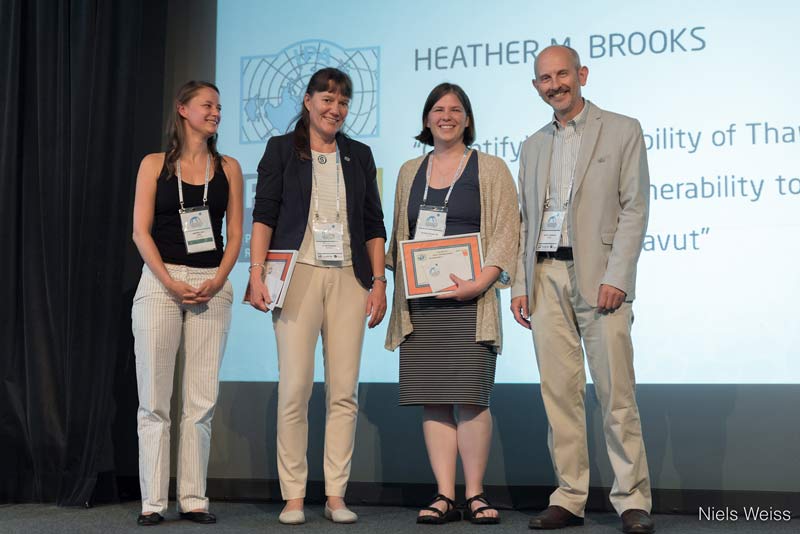
Boris K. Biskaborn (AWI Potsdam) received the PYRN-IPA Award for his science poster presentation entitled “Modern spatial variability of limnoecology and sedimentary processes in a mountain lake at the permafrost margin of southern Yakutia (Russia)”.
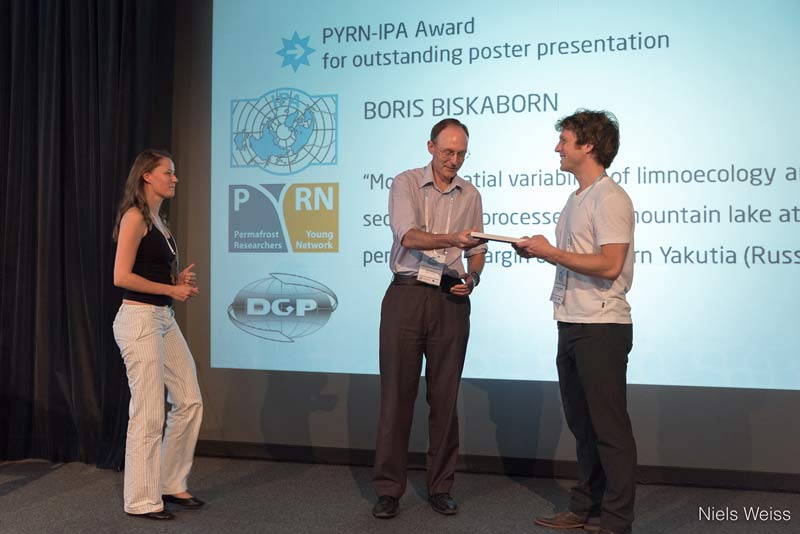
Anna Tolstogan (Lomonosov Moscow State University) received the PYRN-IPA Award for her engineering poster presentation entitled “Changes of the engineering geocryological conditions in the Yamburg settlement (Taz Peninsula)”. Please note that changes were necessary after the conference due to a judging mistake in the evaluation process.
Svetlana Bricheva (Lomonosov Moscow State University) received the PYRN-IPA Award for the best FrostByte of her presentation entitled “Ground penetrating radar detection of visible and “hidden” ice wedges in the Chara Depression (Eastern Siberia, Russia)”. Her FrostByte can be watched here.
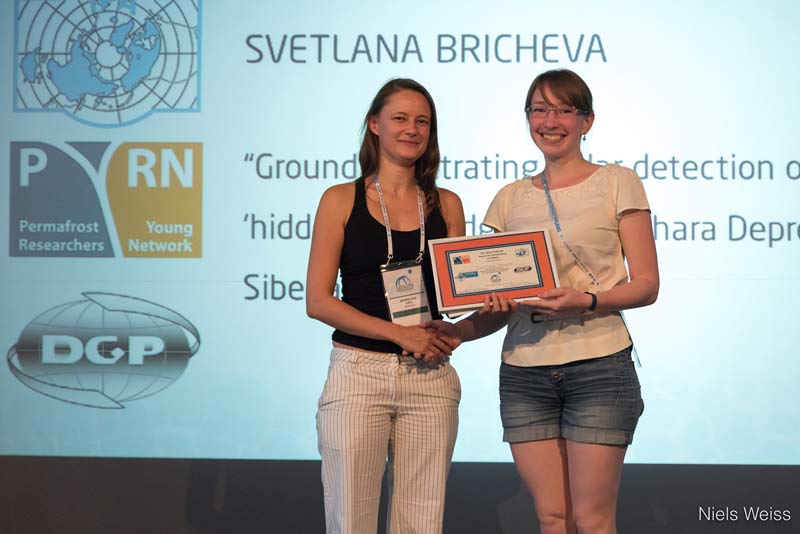
The awards were gratefully sponsored by the International Permafrost Association (IPA), the German Polar Society (DGP) and the Journal “Permafrost and Periglacial Processes” published by John and Wiley. The 2016 PYRN-IPA awardees received a framed certificate and a cash prize of 400 €.
Torre Jorgenson (University of Alaska Fairbanks) received the PPP Award 2016 for Excellence in Permafrost Research and gave the first plenary lecture of the conference. His plenary lecture can be watched here.
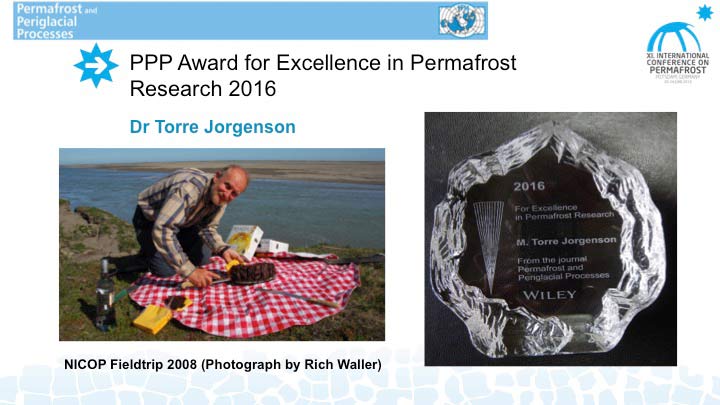
Copyright ® 2014 - 2016 | Alfred-Wegener-Institute
